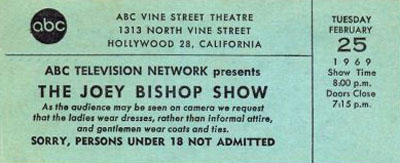Joey Bishop Show, The (1967-1969)

For decades, ABC and CBS tried over and over to establish a berth in late night television and to compete successfully with Johnny Carson on NBC. In 1967, after giving up on a news-oriented discussion program called The Les Crane Show, ABC dropped Joey Bishop into the time slot with a 90 minute talk show that was pure, Tonight Show-style entertainment. Bishop was a natural choice: He’d served well as a guest host for Carson and for Jack Paar before him. And the public seemed to like him. They’d watched the previous Joey Bishop Show — a situation comedy — in sufficient number to keep it on the air from 1961 to 1965. On it, Bishop played a talk show host so, in yet another case of life imitating art, he became a real talk show host.
Bishop’s new show had many things going for it. Regis Philbin was a fine announcer and sidekick who sometimes managed to steal the spotlight from his boss. Johnny Mann was the bandleader and he gave the show a good sound. The whole thing emanated from Hollywood at a time when Carson was still based in New York. That — and Bishop’s many show biz friendships — seemed to guarantee a steady stream of big name guests, though operating on the West Coast did have one big disadvantage. As you can see from the ticket, The Joey Bishop Show taped in the evening. That meant a one-day delay in being broadcast. With so much in the news, Carson’s monologues and guest chats were becoming more topical and Bishop was lagging a day behind. If as sometimes happens in comedy writing, the same joke occurred to both writing staffs at the same time, Joey would be uttering it twenty-four hours after America had heard it from Johnny.
In fact, the biggest plus Bishop had when his show debuted on April 17, 1967 was that he wasn’t opposite Johnny Carson, who was then engaged in a battle with NBC over compensation and control. Johnny was off the air for several weeks, leaving The Tonight Show to a series of guest hosts — primarily country-western singer Jimmy Dean — and the late night audience to Joey. For a brief time, it looked like ABC was establishing its foothold in the time slot and that may have stampeded NBC into acceding to Carson’s demands, which they did. When Johnny returned to his natural habitat, Joey’s ratings dropped significantly. Thereafter, he trailed and the gap grew slowly wider…not that there weren’t moments when it looked like Joey was clawing his way back. Johnny took a lot of vacations, and they always gave Joey a little bump. And when his numbers dipped and rumors of cancellation began to swirl, Joey could usually manage to land a superstar guest and bring some audience back.
One of his highest ratings came after a taping when Regis Philbin abruptly announced that he was quitting the show. The one day delay worked to the show’s benefit that time. The news spread and much of America tuned in to hear Philbin announce — apparently stunning Joey — that the network had never wanted him in the first place and that he had endured too much criticism from them that he was dragging down the show. A few nights later, everyone watched again to hear Bishop announce that everything had been smoothed over, after which he welcomed Regis back to the show. The incident gave Joey two of the few nights he beat Carson but several TV critics suggested it was all an arranged stunt.
Finally though, ABC had to accept the reality of atrophying ratings. In late ’68, CBS announced that Merv Griffin would host an 11:30 talk show to commence the following March. Recognizing that this would split the already-small audience of folks who didn’t choose to watch Johnny, ABC decided to see if Dick Cavett could succeed where Bishop hadn’t. Sure enough, when Merv went on, Joey’s numbers plunged. Bishop didn’t even host the final weeks of his program, leaving it to guest hosts until it was replaced by Cavett in May. Not long after, Carson enlisted Joey as his main guest host and Joey wound up sitting behind Johnny’s desk 177 times, which was the house record until 1983 when Joan Rivers was named “permanent guest host.” It was a great example of the old show business maxim” “If you can’t beat ’em, fill in for ’em.”






